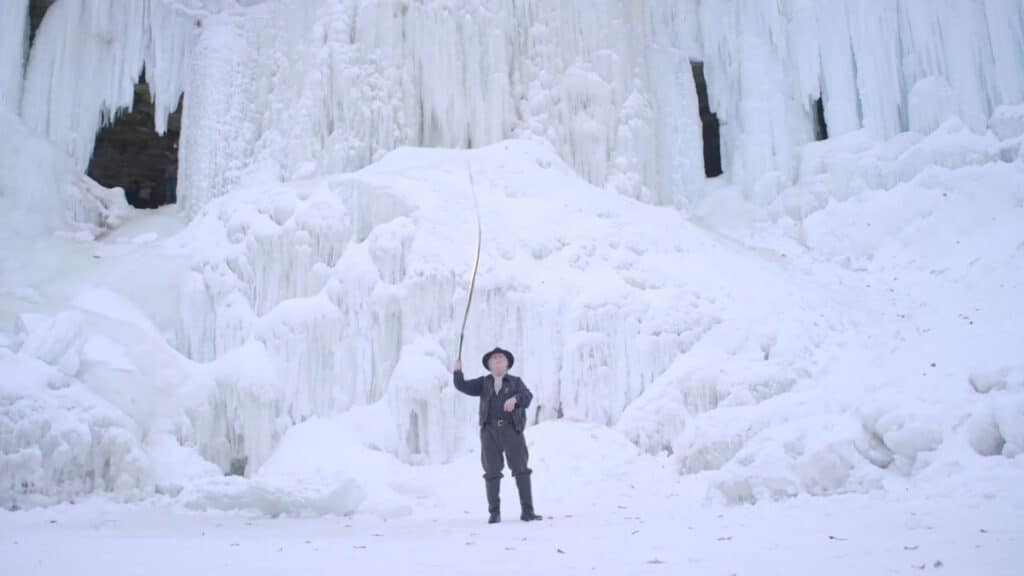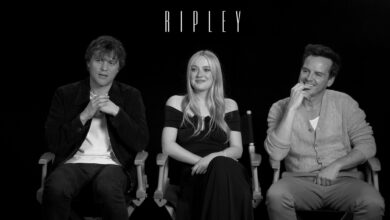After America (2021) is an American drama film. It was written and directed by Jake Yuzna.

After America follows the lives of a handful of individuals, somewhere in Minnesota. Through a series of scenes that at first appear to be unconnected, we observe the lives of the characters as they deal with the various ups and downs (mostly downs) that life hands them. They all struggle to figure out, not only who they really are, but how to be a part of a society that doesn’t seem to allow for anyone who exists outside of its norms.
The film caught me off guard at first, for as it begins, it has a pronounced documentary feel to it. It wasn’t until I was well into the film that I realized that this thing wasn’t a documentary, but in fact a “scripted” narrative. To be clear, I believe that the majority of the film was improvised by the performers, thus providing After America with the cinéma vérité-esque vibe it maintains.
However, as the film progressed. I began to key into what director Jake Yuzna was going for. Or at least, what I thought he was going for. At that point, the film became a compelling, depressing examination of the American dystopia within which so many of us live.
We are overwhelmed by media in this world. The majority of it pushing people this way and pulling them another. Telling them how they should dress, what they should look like, what they should eat, what they should buy, what they should want, etc. People’s lives are shaped by the omnipresence of advertising. It is the notion of “keeping up with the Joneses, heightened to an absurd 21st century degree.

Trouble is, becoming one of the kind of consumers the world tells you that you should be is antithetical to the way a lot of people actually are. We struggle to achieve the ideals that our corporate overlords insist are the only route to true happiness. However, the chase never ends. The longer we maintain the pursuit, the greater the cost to our self-worth and our personal identities.
One of the most poignant shots in the film is one where Dan (Daniel Nies) walks his ass off on a stairmaster at his local Planet Fitness. The film cuts to a wide shot of Dan on the machine, above him, in huge letters is the phrase “judgment free zone.” A noble concept to be sure, but the irony of this statement cuts like a knife. The judgment free zone ends the instant one steps outside of the doors to the Planet Fitness.
The longer I spent with the inhabitants of this world that Yuzna has put under glass for us, the more pronounced their ennui became, and the more I related to these poor bastards with whom so few in the film could relate. Perhaps this is more confessional than a film review should be, but my entire life has been a never-ending series of instances in which, although surrounded by my fellow humans, I have felt agonizingly alone.
The world upon which I look, is populated by people who seem to have figured everything out. They look as if they are comfortably a part of the society in which they exist. They feel connected, and are able to experience life as active participants. Whereas I can only look on from the sidelines. Trapped behind a wall of invisible glass, like a fish in an aquarium, wondering what miracle it would take to tear down the invisible barrier, and allow me to exist as a normal human being, and feel connected. To live for myself, instead of watching others effortlessly accomplish that which is impossible for me.

For me, After America captures the existential despair that I, and apparently, plenty of others feel, fairly successfully. The feeling of being a square peg in a world full of circular holes. Despite the incompatibility of the shapes, the hammer of the cosmos unceasingly rains blows down upon our heads, demanding we conform. And even though we aren’t constructed to conform, we still feel the guilt and anger of always failing at the very thing that seems as effortless as breathing to the people who actually belong on this planet.
There are no established names among the cast as far as I can tell. The only Hollywood pedigree to come to mind was that of the potential familial connection between Jake Yuzna, and celebrated Hollywood outsider Brian Yuzna. Someone of whom I have long been a fan. Turns out Jake is Brian’s nephew. This is appropriate, for if this is the kind of fare Yuzna, Jake is going to turn out, he will almost certainly carve out a niche for himself. A niche that is completely different than that of the guy who gave us Society (Brian Yuzna, 1989), yet equally unique unto himself.
Getting back to the cast, I think that many of the performers in this film are not professional actors. They are all nonetheless very good in this thing. The improvisational style of the film allows the performers to feel completely realistic in their respective searches for meaning in a reality that has none. I firmly believed that everyone in the film was going through whatever they were improvising going through.
I don’t want to put Yuzna on too high a pedestal here, but the synthesis of documentary and scripted narrative; the blurring of those two lines, was the kind of thing that Werner Herzog has employed quite successfully in his career. Films like Stroszek (Herzog, 1977), and Fitzcarraldo (Herzog, 1982) just to name two, are perfect examples of a similar method of obscuring the lines between fantasy and reality that Yuzna has successfully employed in After America.

We live in the age of social media. Social media is a term that I find to be frustratingly ironic. On paper the goal of social media is to bring people together. In practice however, it has a corrosive effect on society and seems to be ripping it apart at the very seams. While not stating it explicitly (or even implicitly perhaps), After America takes a hard look at what happens to those of us whom modern methods of social interaction hasn’t taken under wing quite as successfully as it has others.
This isn’t to suggest that After America is a film about misanthropic technophobes or some shit like that. Rather it is a depiction of individuals for whom life is an existence just outside the periphery of what we are all told life is, or should be about. People who struggle to find meaning in a world that for the most part doesn’t seem to be afflicted with that malady. People who were living life with horse-blinders on, when fate pulled the rug out from underneath them. A cinematic universe of Charlie Browns that, no matter how many times Lucy snatches that Goddamn football away right as they are about to kick it, they keep trying anyways.
After America was good. I liked it. It was fresh and unconventional. It didn’t rip anything off that I am aware of, however it did remind me of several things, all of them good. I’ve already mentioned a couple, but I’d throw Magnolia (P.T. Anderson, 1999), and Eraserhead (David Lynch, 1977) out there too, as films that After America brought to mind. Every one of them a thing of quality. This film isn’t for everybody. For those for whom it is a film though, After America should generate some fascinating discussions. As well as some reflection. Possibly some introspection too. I mean, if you are lucky enough to possess that ability.
Review
Rating
RN Review of After America
After America was good. I liked it. It was fresh and unconventional. It didn't rip anything off that I am aware of, however it did remind me of several things, all of them good.



